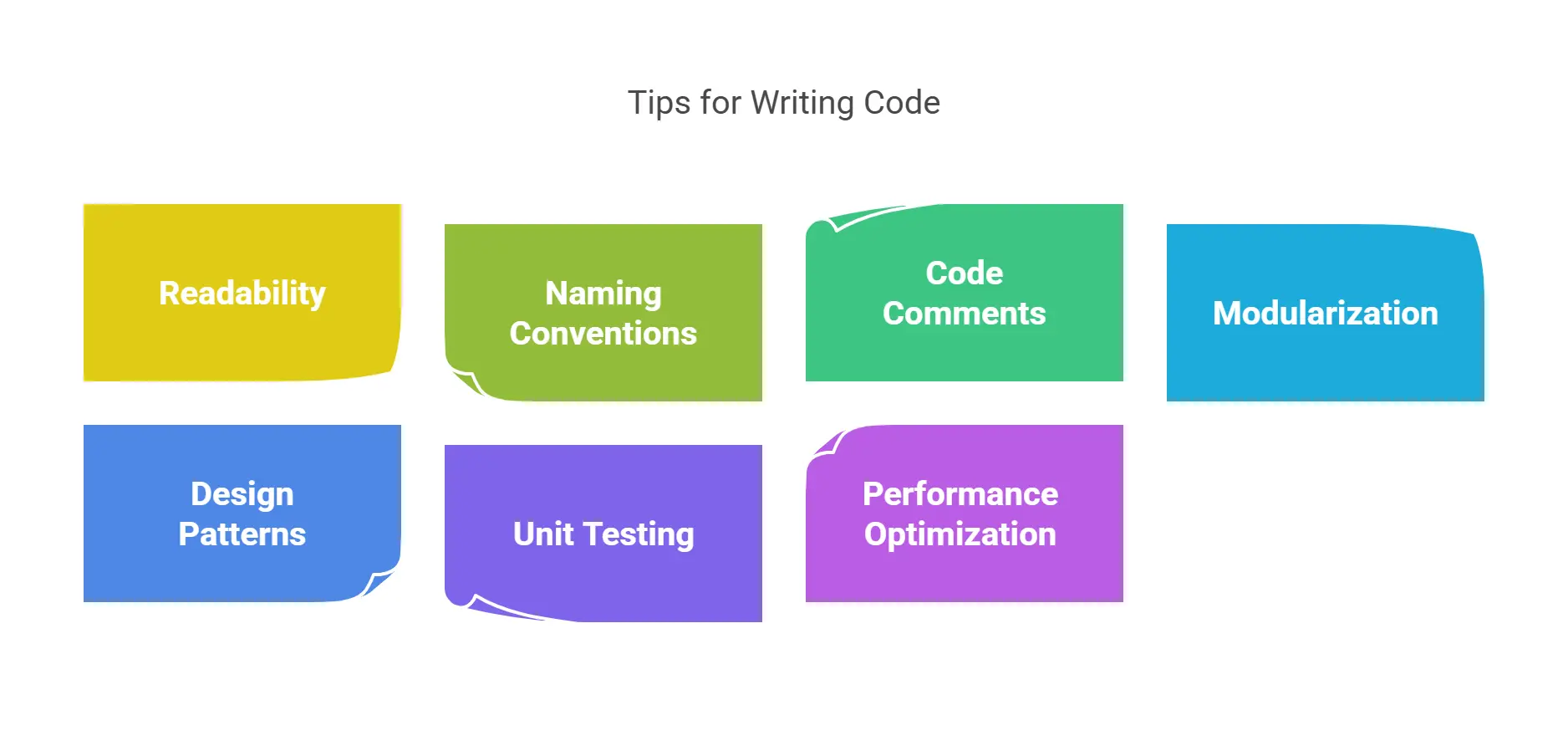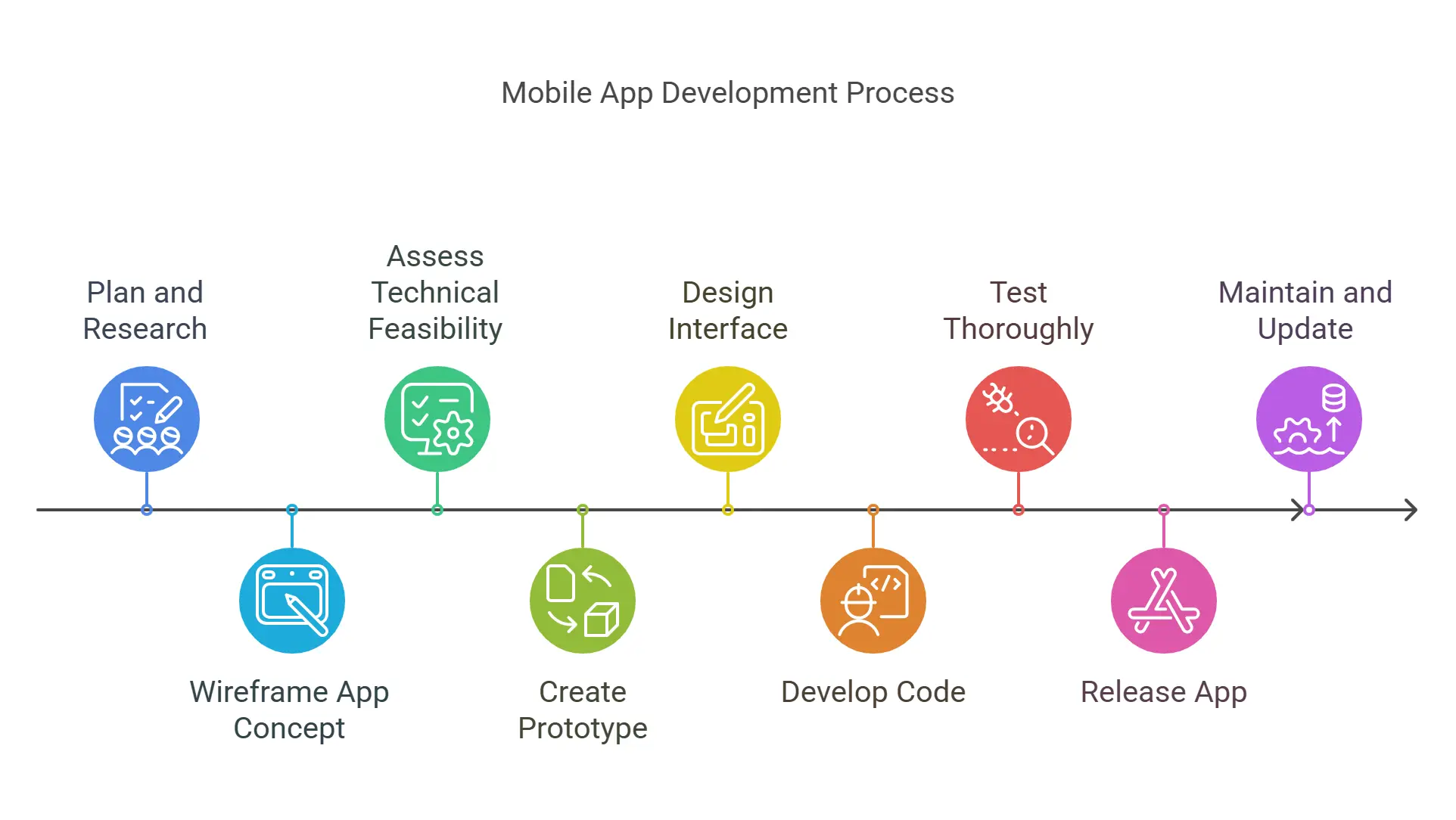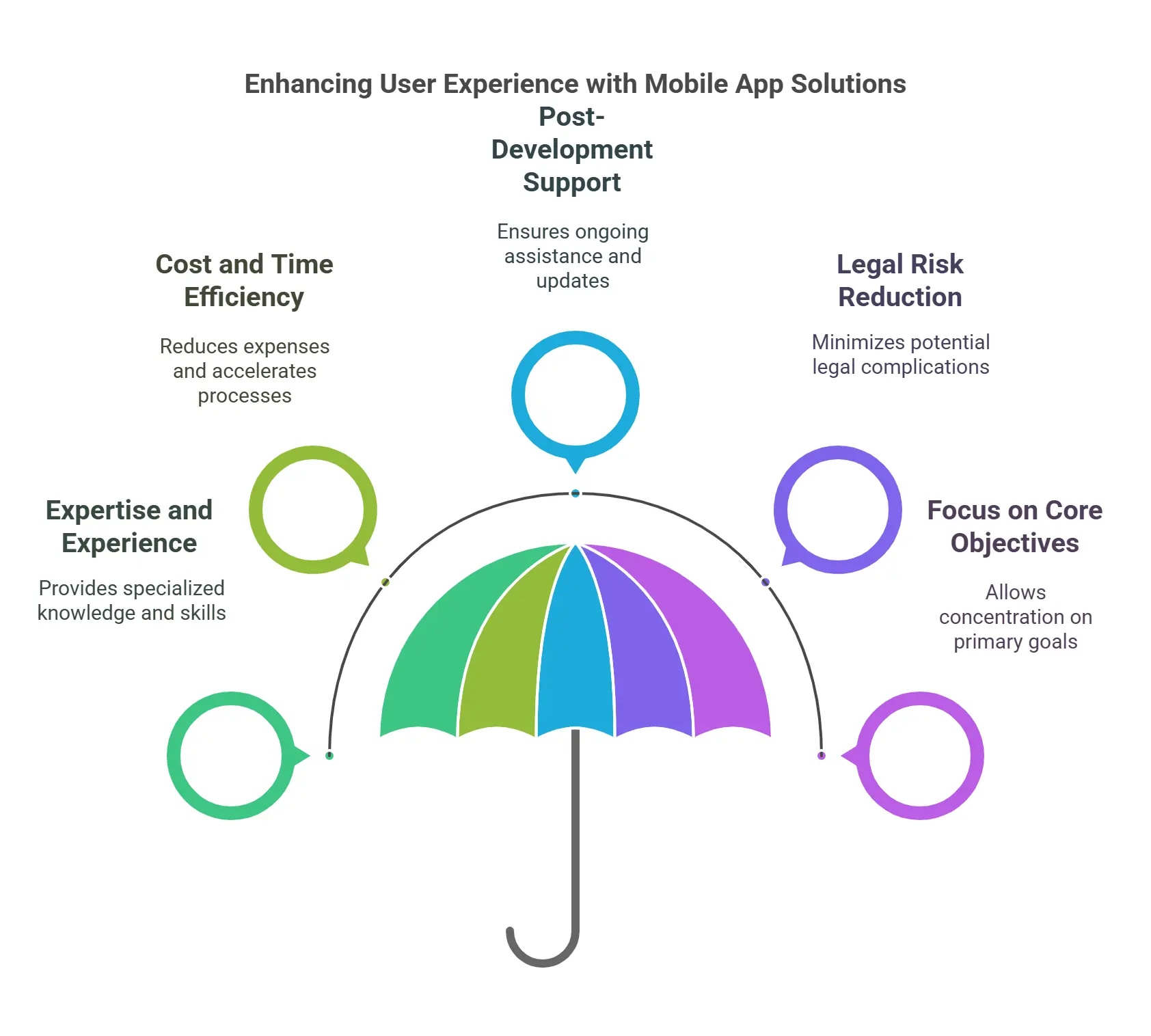
Mobile App Development 101: Everything You Need to Know
One key element of any mobile app’s success is its user experience. An app that’s visually appealing and offers the best in terms of usability, functionality, and accessibility stands the best chance of building a large and loyal base.
Statistics show that 90% of users have stopped using an app due to a poor user experience. This goes to show just how important seamless usability is on a mobile app.
However, ensuring this isn’t always easy, and with outsourcing becoming a buzzword across industries, businesses are looking outside their internal teams to build intuitive apps.
This is where the question arises – how do mobile app solutions impact the user experience of an app?
This blog covers everything you need to know about mobile application development.
Table of Contents:
- What is Mobile App Development?
- Key Approaches to Building a Mobile App
- The Significance of Clean and Efficient Code in Mobile Application Development
- 7 Tips for Writing Clean and Efficient Code for Your Mobile App
- Steps to Develop a Mobile App
- Five Ways in Which Mobile Apps Solutions Can Improve Your App’s User Experience
- Conclusion
What is Mobile App Development?
Mobile application development involves designing and creating software applications for mobile devices like smartphones and tablets. Such an application can be downloaded from an app store, come preinstalled on the device, or be accessed using a mobile web browser.
Generally, this type of software development involves using Java, C#, Swift, and HTML5 as programming and markup languages.
Key Approaches to Building a Mobile App
You can build a mobile app in various ways. The following are some of the popular approaches followed by mobile app developers:
1. Native App
It is a platform-specific app that can run only on a particular operating system. This means mobile application companies would have to develop an app differently for Android and iOS when following this approach.
While developing a native app is expensive, it offers a good performance and user experience.
2. Cross-Platform App
This app is based on a single, unified code that can run on multiple platforms. So, after coding once, mobile app companies can make it work for Android and iOS.
Since it is a platform-independent app, it is cheaper to build.
3. Hybrid App
A hybrid app is a blend of two apps: a web application and a native mobile app. When building this app, a mobile application development agency transforms a web application into a native shell.
This app is faster and easier to build but may suffer performance issues.
4. Progressive Web App
This web application extends a user experience similar to a native app. Since this app runs on the web, there’s no need to install a separate app for it.
The plus points of Progressive Web apps are that they perform better, consume less data, and enhance engagement rates.
The Significance of Clean and Efficient Code in Mobile Application Development
Clean and efficient code offers a multitude of benefits for mobile application development:
- Enhanced Maintainability: Well-written code is easier to understand and modify, allowing developers to introduce new features or fix bugs efficiently. This is particularly crucial as apps evolve and require ongoing maintenance.
- Reduced Development Time: Clean code promotes better code comprehension, minimizing time spent deciphering complex structures. This leads to a faster development process and quicker time-to-market for your app.
- Improved Debugging: Clean code is easier to debug, as the logic is clear and well-organized. This translates to faster issue identification and resolution, ensuring a smooth user experience.
- Enhanced Team Collaboration: Clean code fosters better communication and collaboration within development teams. When code is easy to understand, developers can work together more effectively.
- Optimized Performance: Clean and efficient code typically produces a more performant app. By avoiding unnecessary redundancies and optimizing resource usage, your app runs smoother and delivers a faster user experience.
By prioritizing clean code, developers lay the foundation for a successful mobile app, ensuring long-term sustainability and user satisfaction.
7 Tips for Writing Clean and Efficient Code for Your Mobile App
Writing clean and efficient code is the foundation for a successful mobile app. It ensures your app development runs smoothly, is easy to maintain, and delivers a delightful user experience. Here are seven key tips to elevate the quality and efficiency of your mobile app’s code:
1. Prioritize Readability and Maintainability
Writing clear and concise code is essential while maintaining consistency in formatting and simplifying complex functions. You must strive for simplicity and avoid overly complex logic structures and convoluted algorithms. Instead, you can use clear variable names that reflect their purpose (e.g., ‘userName’ instead of ‘u’). When necessary, enhance readability with meaningful comments that explain non-obvious logic but avoid over-commenting in well-structured code.
Maintain a consistent style throughout your codebase for indentation, spacing, and formatting. This improves readability and makes navigating the code much easier for you and future developers. Don’t hesitate to break large chunks of code into smaller, well-defined functions with clear purposes. This promotes modularity, improves readability, and helps with troubleshooting.
2. Know the Art of Naming Conventions
Utilize descriptive variable and function names that accurately reflect their purpose. This eliminates the need for excessive commenting and instantly clarifies what each piece of code does.
For example, ‘calculateTotalCost’ is much more understandable than ‘calcTotal.’ Adhere to a consistent naming convention throughout your entire app. This ensures predictability and makes the code easier to navigate for you and other developers.
3. Leverage Code Comments Strategically
Documenting non-obvious logic and design choices is essential. Use comments to explain complex algorithms or logic that might not be immediately clear. However, avoid over-commenting well-structured code that is already self-documenting.
Always clarify assumptions and dependencies. Document any assumptions made within the code or external dependencies it relies upon. This aids future developers in understanding the code’s context and potential limitations.
4. Apply Modularization and Reusability
Organize your code into well-defined modules that encapsulate specific functionalities. This promotes code reuse, reduces redundancy, and simplifies maintenance. Think of your code as building blocks – the more reusable blocks you have, the easier it is to construct new features.
Modern mobile development platforms for iPhone and Android apps offer vast libraries and frameworks that provide pre-built, well-tested code components. Utilize these resources to avoid reinventing the wheel. Focus your efforts on your app’s unique functionalities and use libraries for everyday tasks like networking or image loading.
5. Use Effective Design Patterns
Make it a practice to identify common programming problems and solutions. Design patterns offer established and proven solutions to recurring programming challenges. Learn and implement relevant design patterns to enhance code structure, maintainability, and scalability.
Don’t force-fit a design pattern into your code. Carefully analyze the problem you’re trying to solve and select the pattern that best addresses the specific challenge.
6. Implement Unit Testing
Unit testing involves creating automated tests for individual functions or modules within your code. It helps you isolate and verify each code unit’s functionality independently. Unit tests catch bugs early in the development cycle, leading to a more robust and reliable app.
It also helps identify bugs and potential issues early in the development cycle. This leads to a more robust and reliable app, minimizing crashes and unexpected behavior. With unit tests in place, you can refactor code with greater confidence, knowing that the underlying functionality remains intact. This promotes agility and simplifies future maintenance efforts. You can make changes to your codebase without worrying about breaking something else.
7. Employ Performance Optimization Techniques
Utilize profiling tools to identify areas of your code that consume excessive resources or slow down app performance. These tools pinpoint where your app might be struggling, allowing you to optimize those sections.
Minimize unnecessary memory allocations and optimize resource handling to ensure your app runs smoothly, even on devices with limited resources. A well-optimized app uses resources efficiently, leading to a better user experience. Implementing these performance optimization tips ensures your mobile app delivers a responsive and enjoyable user experience.
Steps to Develop a Mobile App
The creation of a successful mobile app involves several steps. Here’s a general outline of the steps needed for your mobile application development:
1. Step 1: Plan and Research
Every mobile app development process starts with a basic idea. Once you have an idea, plan and research well to see whether it will be worthwhile to pursue it or not.
2. Step 2: Wireframe Your App’s Concept
Wireframing your concept means creating a rough outline of your app. Conceptualize your app’s functions and decide how they all should work together.
3. Step 3: Assess the App’s Technical Feasibility
During this stage, you need to test the technical feasibility of your app’s design. You may consider recruiting a mobile app development agency to get the most out of your technical feasibility study.
4. Step 4: Create a Prototype
Build a prototype of the mobile app. It should have the primary functions of the app in working condition. This functional version may not be perfect, but it should be good enough for a trial run.
5. Step 5: Design the Interface
At this stage, you should refine the design components of your mobile app. Seek feedback from your prototype testers regarding the graphic interface and make necessary changes.
6. Step 6: Develop the Code
Decide whether your mobile app will be hybrid, native, cross-platform, or progressive web. Select your platform, programming language, and other necessary aspects, and begin coding.
7. Step 7: Test Thoroughly and Repeatedly
You need to test your mobile app right from the initial design stage. Continue testing thoroughly and repeatedly through each step. You should have a team of testers to test every aspect of the app minutely. It is a basic rule that even the best mobile app development company follows.
8. Step 8: Release Your App
Get ready to roll out your mobile app to the public! Choose a date to launch your app and publicize it on social media platforms well in advance. Follow the guidelines to submit your app to the app stores for public use.
9. Step 9: Maintain and Update Your App
After you launch your app, pay attention to the feedback from the public. Make adjustments based on the most common complaints or criticism. Also, consider the suggestions to improve the future versions of your mobile app and update frequently.
Five Ways in Which Mobile Apps Solutions Can Improve Your App’s User Experience
Mobile app solution providers have had a major impact on the overall user experience, and there are various reasons for this. This section explores five such reasons for opting for mobile application development services.
1. They Offer Immense Expertise and Experience
One key reason businesses worldwide hire a dedicated mobile app development agency is that it traditionally offers expertise.
These agencies design, maintain, and scale mobile apps for businesses across sectors worldwide. This experience allows them to understand the needs of the companies they work with and their customers.
These app development companies have dedicated coders, designers, and developers who work seamlessly together. Their industry insights and market expertise allow them to refine ideas and guide businesses toward designing apps that will garner a more extensive user base.
Additionally, most reputed app development companies assign a dedicated project manager to each business. This ensures their customers always have someone to contact for more information, feedback, and more.
2. The Benefits of Cost and Time Efficiency
Another primary reason for the success of SaaS businesses worldwide is that they offer valuable time and cost benefits.
When you outsource your app development needs to a dedicated third party, you negate the hassle of hiring a full-time team, which, as we all know, is time-consuming.
Statistics show that the average time to hire is roughly 36 days, and the costs of doing so are also rather high.
Conversely, hiring a third party is a relatively quicker process. Given their expertise, they quickly understand your needs and objectives, leading to increased efficiency overall.
The cost benefits aren’t to be ignored either. The upside of hiring an app development agency is that you only pay for the services you avail of, thereby reducing your overall costs in the long run.
3. Post Development Support and Maintenance Is Guaranteed
The process of developing an app doesn’t stop once it’s launched. One could say that the real work only begins after the app is available for users to download.
Maintaining and scaling an app is key to ensuring user retention. Mobile application development companies can ensure that your app is maintained and that any bugs and issues are handled in real time.
Additionally, scaling your app to cater to customer feedback and offer newer features is key to retaining users over time. The benefit of working with an app developer on scaling your app is that they already understand your business’s objectives and can translate this into meaningful updates.
4. Reduced Risk of Legal Issues
Running a business involves addressing various legal issues, which can often be overwhelming, especially for startups.
However, working with a third party can negate the risk of these legal issues. They’re already legally licensed and follow the regulations to ensure seamless operation.
Their work involves following a well-laid-out strategy and framework that minimizes the risk of potential legal issues. Additionally, they’re bound by a Non-Disclosure Agreement or an NDA with every client, thereby ensuring that all business dealings remain confidential.
This reduced legal burden ensures that businesses and app development agencies can collaborate to ensure a seamless user experience.
5. They Allow You to Focus On Your Core Business Objectives
While larger organizations often have their app developers in-house, startups tend to outsource their needs to third parties. This allows them to focus on their core business objectives, especially if they’re bootstrapping.
This allows them to spend their time and resources on advertising and marketing, fostering relationships, and much more.
At the same time, it gives them the time to offer constructive feedback on their app’s development, which helps improve its user experience.
The 24×7 availability of third-party agencies ensures that these improvements can be made immediately. It also ensures they’re quick to solve any potential problems.
Conclusion
A mobile app is essential for expanding your business’s reach and increasing customer engagement. But first, you need to build the app successfully, which is often a demanding and time-consuming process. If you want to develop a highly functional app with an attractive design, consider seeking professional help.
Hurix Digital is one of the top companies offering mobile application development services. With years of expertise, our experts can help you to build any type of mobile app.
Contact us today to turn your mobile app vision into reality.

Vice President & SBU Head –
Delivery at Hurix Technology, based in Mumbai. With extensive experience leading delivery and technology teams, he excels at scaling operations, optimizing workflows, and ensuring top-tier service quality. Ravi drives cross-functional collaboration to deliver robust digital learning solutions and client satisfaction











